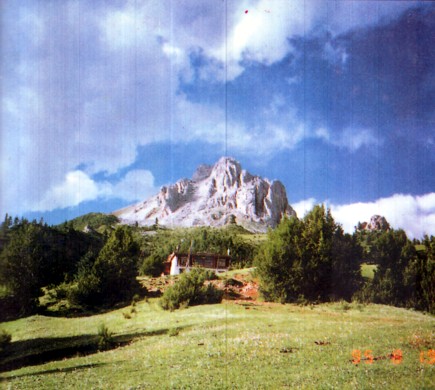Kalzang Monastery: Difference between revisions
No edit summary |
No edit summary |
||
| (7 intermediate revisions by 5 users not shown) | |||
| Line 1: | Line 1: | ||
[[Image:Kalzang Gonpa.jpg|frame|'''Kalzang Monastery''']] | [[Image:Kalzang Gonpa.jpg|frame|'''Kalzang Monastery''']] | ||
'''Kalzang Monastery''' ([[Wyl.]] ''bskal bzang dgon pa'') | '''Kalzang Monastery''' (Tib. བསྐལ་བཟང་དགོན་པ་, [[Wyl.]] ''bskal bzang dgon pa'') was founded by [[Nyala Pema Dündul]] in the centre of [[Nyarong]] in 1860. During the consecration, Nyala Pema had seen a vision of all the [[1002 buddhas of this Fortunate Aeon|thousand buddhas of this aeon]], the ‘Good Kalpa’ or ‘Fortunate Age’, dissolving into the site. So he named the monastery Kalzang Sangyé Chöling, “Dharma Sanctuary of the One Thousand Buddhas of the Fortunate Age”. In time, Kalzang Gonpa became the seat of [[Tertön Sogyal]], and with the assistance of the [[Thirteenth Dalai Lama]], he expanded the monastery and filled it with many sacred images and scriptures. | ||
On August 12th 1998, [[Sherab Özer Rinpoche]] performed a simple, symbolic ceremony in [[Lerab Ling]] in which he offered the throne of Kalzang Monastery to [[Sogyal Rinpoche]] as the heir to Tertön Sogyal. | On August 12th 1998, [[Sherab Özer Rinpoche]] performed a simple, symbolic ceremony in [[Lerab Ling]] in which he offered the throne of Kalzang Monastery to [[Sogyal Rinpoche]] as the heir to Tertön Sogyal. | ||
| Line 6: | Line 6: | ||
==Further Reading== | ==Further Reading== | ||
===In Tibetan=== | ===In Tibetan=== | ||
*Shes rab 'od zer & byang chub rgya mtsho, ''shar rgyal ba bskal bzang dgon gyi byung ba rags bsdus'', si khron mi rigs dpe skrun khang, 1996 | *Shes rab 'od zer & byang chub rgya mtsho, ''shar rgyal ba bskal bzang dgon gyi byung ba rags bsdus'', si khron [[Mirik Petrün Khang|mi rigs dpe skrun khang]], 1996 | ||
===In English=== | ===In English=== | ||
*'On an Island of Wish-fulfilling Jewels' in ''Rigpa Journal'', January 2000, pages 54-59 | *'On an Island of Wish-fulfilling Jewels' in ''Rigpa Journal'', January 2000, pages 54-59 | ||
*Matteo Pistono. ''In the Shadow of the Buddha: Secret Journeys, Sacred Histories, and Spiritual Discovery in Tibet'', Dutton, 2011. ISBN 978-0525951193 | |||
[[Category:Nyingma Monasteries]] | [[Category:Nyingma Monasteries]] | ||
[[Category:Tertön Sogyal]] | |||
Latest revision as of 07:20, 13 February 2019

Kalzang Monastery (Tib. བསྐལ་བཟང་དགོན་པ་, Wyl. bskal bzang dgon pa) was founded by Nyala Pema Dündul in the centre of Nyarong in 1860. During the consecration, Nyala Pema had seen a vision of all the thousand buddhas of this aeon, the ‘Good Kalpa’ or ‘Fortunate Age’, dissolving into the site. So he named the monastery Kalzang Sangyé Chöling, “Dharma Sanctuary of the One Thousand Buddhas of the Fortunate Age”. In time, Kalzang Gonpa became the seat of Tertön Sogyal, and with the assistance of the Thirteenth Dalai Lama, he expanded the monastery and filled it with many sacred images and scriptures.
On August 12th 1998, Sherab Özer Rinpoche performed a simple, symbolic ceremony in Lerab Ling in which he offered the throne of Kalzang Monastery to Sogyal Rinpoche as the heir to Tertön Sogyal.
Further Reading
In Tibetan
- Shes rab 'od zer & byang chub rgya mtsho, shar rgyal ba bskal bzang dgon gyi byung ba rags bsdus, si khron mi rigs dpe skrun khang, 1996
In English
- 'On an Island of Wish-fulfilling Jewels' in Rigpa Journal, January 2000, pages 54-59
- Matteo Pistono. In the Shadow of the Buddha: Secret Journeys, Sacred Histories, and Spiritual Discovery in Tibet, Dutton, 2011. ISBN 978-0525951193